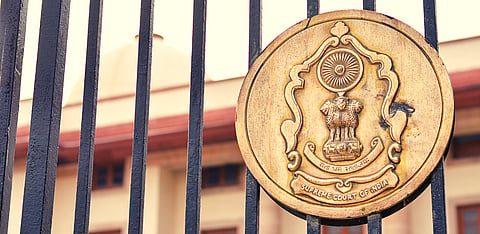

The court decided on the question of whether the 'affinity test' is integral for determining the Schedule Tribe status of an applicant by a scrutiny committee.
—
ON Friday, the Supreme Court division bench comprising Justices A.S. Oka and Manoj Misra held that the 'affinity test' is not an essential part of the process of determining the correctness of a Scheduled Tribe (ST) claim. The judgment came pursuant to a reference pertaining to the question of whether the affinity test is integral for determining the ST status of an applicant by a 'scrutiny committee'.
A scrutiny committee is a statutory body for verification of ST certificates. After obtaining the ST certificate from a competent authority, any person who wants to avail its benefits or concessions can apply to the relevant scrutiny committee for the verification of such certificate and the issue of a validity certificate.
Whereas a 'vigilance cell' is authorised to investigate ST claims by verifying and collecting all the facts of the social status claimed by the candidate or their parent or guardian, the affinity test is used to sift through distinct traits to link a person to a tribe.
The bench observed that when an application is moved with the scrutiny committee, the case can be referred to the vigilance cell. It noted that by referring the case to the vigilance cell, the scrutiny committee must record its basis for coming to the conclusion that it is not satisfied by the materials produced by the applicant.
"Only after the case is referred to the vigilance cell for making an inquiry, an occasion for the conduct of an affinity test will arise," the bench emphasised. The affinity test cannot be a conclusive measure in any case, it added.
While pronouncing the judgment, Justice Oka explained that when the affinity test is conducted by the vigilance cell, the result of the test, along with all other material on record that add probative value, will have to be taken into consideration by the scrutiny committee for deciding the tribe claim. The affinity test is not a litmus test to decide a tribe claim, the bench concluded.
The bench directed the registry to press appeals before the appropriate bench for deciding the same in light of the reference answered by the bench.
On February 10, a three-judge bench of the Supreme Court comprising Justices A.S. Oka, S.K. Kaul and Manoj Mishra heard the petition on the question of whether the affinity test is integral to determining the ST status made by the scrutiny committee and reserved its judgment.
The bench took up the hearing on reference by a division bench, comprising Justices Hemant Gupta and V. Ramasubramanian in March 2022 to address the non-uniform parameters set by courts for verification of ST certificates by a larger bench. The division bench said it wanted to fix "fool-proof parameters" to determine if a person belongs to an ST, entitling them to the benefits due to the community. According to the bench, there is a likelihood that contact with other cultures, migration and modernisation would have erased the traditional characteristics of a tribe.
To highlight the different parameters considered by the courts, in the case of Shilpa Vishnu Thakur versus State of Maharashtra & Ors. (2009), the full bench of the Bombay High Court had examined standards to be applied in determining whether or not an applicant belongs to a designated ST. The bench had opined that the claim to belong to an ST involves an investigation into the affinity of the candidate with a tribe or tribal community, which includes the rituals, customs, worship and ceremonies of the tribe. Such a claim is not confined to an examination of the birth and the school records and of documentary evidence, the bench had noted.
However, in the case of Anand versus Committee for Scrutiny and Verification of Tribe Claims & Ors. (2011), the Supreme Court had observed that the affinity test cannot be the sole criterion for establishing the link of an applicant with an ST, and may be used to corroborate documentary evidence. According to the bench, with migrations, modernisation and contact with other communities, the present traits of an applicant may not match their tribe's peculiar anthropological and ethnological traits, and they should not be denied the benefits extended to their tribe.
Click here to read the judgment.